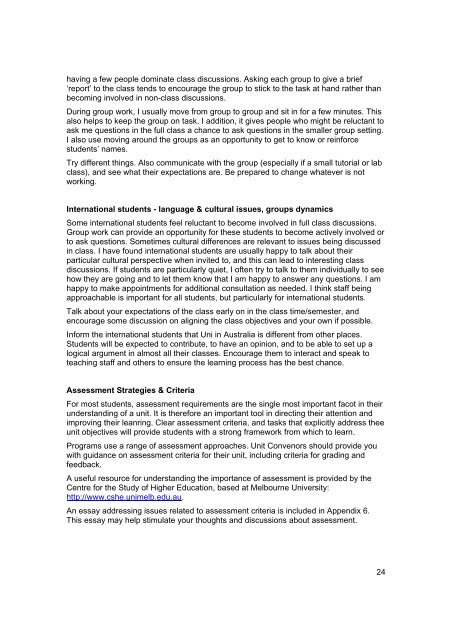Staff Information & Teaching Guide - Swinburne University of ...
Staff Information & Teaching Guide - Swinburne University of ...
Staff Information & Teaching Guide - Swinburne University of ...
You also want an ePaper? Increase the reach of your titles
YUMPU automatically turns print PDFs into web optimized ePapers that Google loves.
having a few people dominate class discussions. Asking each group to give a brief<br />
‘report’ to the class tends to encourage the group to stick to the task at hand rather than<br />
becoming involved in non-class discussions.<br />
During group work, I usually move from group to group and sit in for a few minutes. This<br />
also helps to keep the group on task. I addition, it gives people who might be reluctant to<br />
ask me questions in the full class a chance to ask questions in the smaller group setting.<br />
I also use moving around the groups as an opportunity to get to know or reinforce<br />
students’ names.<br />
Try different things. Also communicate with the group (especially if a small tutorial or lab<br />
class), and see what their expectations are. Be prepared to change whatever is not<br />
working.<br />
International students - language & cultural issues, groups dynamics<br />
Some international students feel reluctant to become involved in full class discussions.<br />
Group work can provide an opportunity for these students to become actively involved or<br />
to ask questions. Sometimes cultural differences are relevant to issues being discussed<br />
in class. I have found international students are usually happy to talk about their<br />
particular cultural perspective when invited to, and this can lead to interesting class<br />
discussions. If students are particularly quiet, I <strong>of</strong>ten try to talk to them individually to see<br />
how they are going and to let them know that I am happy to answer any questions. I am<br />
happy to make appointments for additional consultation as needed. I think staff being<br />
approachable is important for all students, but particularly for international students.<br />
Talk about your expectations <strong>of</strong> the class early on in the class time/semester, and<br />
encourage some discussion on aligning the class objectives and your own if possible.<br />
Inform the international students that Uni in Australia is different from other places.<br />
Students will be expected to contribute, to have an opinion, and to be able to set up a<br />
logical argument in almost all their classes. Encourage them to interact and speak to<br />
teaching staff and others to ensure the learning process has the best chance.<br />
Assessment Strategies & Criteria<br />
For most students, assessment requirements are the single most important facot in their<br />
understanding <strong>of</strong> a unit. It is therefore an important tool in directing their attention and<br />
improving their leanring. Clear assessment criteria, and tasks that explicitly address thee<br />
unit objectives will provide students with a strong framework from which to learn.<br />
Programs use a range <strong>of</strong> assessment approaches. Unit Convenors should provide you<br />
with guidance on assessment criteria for their unit, including criteria for grading and<br />
feedback.<br />
A useful resource for understanding the importance <strong>of</strong> assessment is provided by the<br />
Centre for the Study <strong>of</strong> Higher Education, based at Melbourne <strong>University</strong>:<br />
http://www.cshe.unimelb.edu.au.<br />
An essay addressing issues related to assessment criteria is included in Appendix 6.<br />
This essay may help stimulate your thoughts and discussions about assessment.<br />
24

















